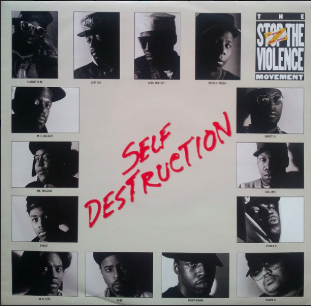The Lasting Impact of "Self Destruction": A Reflection on Hip Hop’s Call to Action
In 1989, hip hop culture underscored its role as a voice for social change with the release of "Self Destruction." This pivotal track emerged from the Stop the Violence Movement, spearheaded by influential artist KRS-One, and featured prominent figures from the East Coast hip hop scene. This collaborative effort not only resonated with listeners at the time but has since become a landmark moment in music history, highlighting the genre’s potential to challenge societal issues and promote unity.
The Power of the Message
"Self Destruction" arrived at a tumultuous time when violence was spiraling in urban communities, particularly among young Black men. The tragic death of Scott La Rock, a Boogie Down Productions member, alongside violence at performances, injected urgency into the song’s message. KRS-One recognized the responsibility of hip hop artists to use their platform for transformation and advocacy, leading to the creation of a song that struck a chord with a generation.
The urgency and sincerity of the song’s message are evident in the diverse voices that contribute to its impact. Each artist’s powerful verses articulated a collective desire for change, promoting the notion that hip hop could foster awareness and healing rather than glorifying violence. The song’s reach extended beyond superficial entertainment—it became a communal rallying cry for a culture facing real challenges.
Lyrics We All Memorized
For those who experienced its release, the lyrics of "Self Destruction" became part of their cultural lexicon. This was not merely a song to enjoy; it was an anthem that demanded introspection. Lines like MC Lyte’s fierce verses and Chuck D’s authoritative delivery reinforced the message about the dangers of self-inflicted harm and societal neglect. Fans engaged deeply with the lyrics, incorporating them into conversations and social awareness.
The track’s infectious energy and relevant themes turned it into a staple among hip hop enthusiasts, spreading awareness about the very real consequences of violence within their communities. The experience of memorizing and embracing these lyrics allowed listeners to feel they were part of a larger movement toward change.
A Moment Bigger Than Music
Musically, "Self Destruction" made history by debuting at No. 1 on the inaugural Billboard Hot Rap Songs chart and holding that position for ten weeks. More than just a commercial success, it raised over $100,000 for the National Urban League, demonstrating a commitment to social justice and community welfare. This financial contribution was a testament to the song’s ability to mobilize not just listeners but an entire culture.
The significance of “Self Destruction” transcended chart rankings and popularity; it represented hip hop’s capacity to operate as a vehicle for social critique and empowerment. Beyond its musical achievement, it offered crucial lessons about responsibility and community engagement, positioning hip hop as a force for tangible change.
A Legacy of Empowerment
Over three decades later, "Self Destruction" continues to serve as a blueprint for conscious rap and a reminder of the genre’s potential to inspire and educate. It encapsulates the belief that music can be a catalyst for dialogue and understanding. For those who grew up in the era of its release, the lyrics still evoke a powerful emotional response, grounding them in a time when artists took a stand against violence and destruction.
In reflecting on this cultural milestone, it is essential to recognize the enduring influence of "Self Destruction." It serves as an inspiration for current artists and activists who seek to use their platforms for advocacy. The song’s legacy emphasizes that art holds the power to shape perspectives and foster unity, proving that hip hop is not merely entertainment—it is a vital and transformative medium that can alter the course of communities.
As the genre continues to evolve, the message of "Self Destruction" remains relevant. It is a call to action for both artists and audiences to confront the complexities of society and strive for a better future. Truly, “Self Destruction” has become a classic—an enduring reminder that music can stand at the intersection of consciousness and culture, echoing through time as a source of inspiration and change.
For those interested in revisiting this iconic piece, “Self Destruction” can still be heard on various music platforms, allowing new generations to engage with its meaningful message. Listen to "Self Destruction" here.









